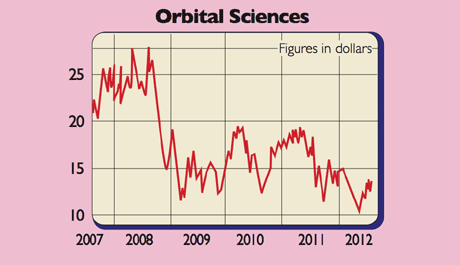The future of space exploration
The International Space Station is 20 years old. A robot has landed on Mars. Billionaire adventurers have set their sights on the stars. What next for humankind’s great space adventure?
Get the latest financial news, insights and expert analysis from our award-winning MoneyWeek team, to help you understand what really matters when it comes to your finances.
You are now subscribed
Your newsletter sign-up was successful
Want to add more newsletters?

Twice daily
MoneyWeek
Get the latest financial news, insights and expert analysis from our award-winning MoneyWeek team, to help you understand what really matters when it comes to your finances.

Four times a week
Look After My Bills
Sign up to our free money-saving newsletter, filled with the latest news and expert advice to help you find the best tips and deals for managing your bills. Start saving today!
What's happened?
The past week has seen two highly significant and contrasting moments in the history of the human exploration of space. First, the International Space Station (ISS), which circles the Earth in low orbit, marked its 20th anniversary to relatively little media fanfare. As its operations are defunded and wound down over the coming decade, its replacements are set to be commercially driven enterprises from the likes of Axiom Space and Bigelow Aerospace. The week's other major milestone, which generated rather more excitement, was the successful mission by Nasa's Jet Propulsion Laboratory to land a new robot on Mars (the first since 2012) following a dramatic seven-minute, high-velocity descent. The Insight landing is significant for two main reasons. First, it included two briefcase-sized satellites called MarCO A and B, which cost $20m. Second, its mission is to probe the deep interior of the planet, making Mars the first planet other than Earth to be examined in this way.
What do these events tell us?
They highlight that (a) the practical and commercial case for manned space flight is getting ever weaker with each advance in materials science, robotics and miniaturisation; and (b) the future of space exploration will be less driven by governments and more by private enterprises. The scientific and technical pay-off from the ISS has not been "negligible", according to the Astronomer Royal, Martin Rees but the manned space flights sending astronauts back and forth to staff it have proved less cost-effective than unmanned missions. "Nor are these voyages inspiring in the way that the pioneering Soviet and US space exploits were." In the 1960s, Nasa absorbed more than 4% of the US federal budget, says Rees. Now the figure is 0.6%. "Had that momentum been maintained, there would surely be footprints on Mars by now."
Can that momentum be recaptured?
In terms of manned exploration of space, the US is talking again about sending people to the Moon for the first time since 1972 as a first step towards a manned mission to Mars. The red planet is also the long-term focus of China's space-science programme. But sending humans to Mars is a prospect that remains decades away, and throws up not just giant engineering challenges but even more radical biological ones. For example, we currently lack understanding of how organic molecules in our bodies will react to the far higher levels of radiation not to mention the fact that its atmosphere is 95% carbon dioxide. Rees suggests that to survive on Mars, human "settlers" may need to redesign themselves to adapt to the alien environment, harnessing all the genetic and cyborg technologies that will be invented in coming decades. This, he writes in the FT, might be "the first divergence into a new species" and even a transition to "fully inorganic intelligences" and "non-biological brains".
MoneyWeek
Subscribe to MoneyWeek today and get your first six magazine issues absolutely FREE

Sign up to Money Morning
Don't miss the latest investment and personal finances news, market analysis, plus money-saving tips with our free twice-daily newsletter
Don't miss the latest investment and personal finances news, market analysis, plus money-saving tips with our free twice-daily newsletter
What about closer to home?
Increasingly, the future of manned space flight lies with privately funded billionaire adventurers developing flights for sale to paying customers. Within a year or two, most analysts expect either SpaceX (led by Elon Musk) or Blue Origin (bankrolled by Jeff Bezos) to launch their first paid-for orbital flights. Musk's firm has a proven record of flying cargo to the ISS, and its Falcon launcher has shown that it's possible to recover and reuse the launch rocket's first stage a massively significant breakthrough that presages real cost savings. Meanwhile, when it comes to the construction and launch of satellites, advances in materials science have produced stronger and lighter nanomaterials and biomaterials that can go further in space but use fewer resources. As a result, space scientists are considering applications that once seemed fantastical, and small start-ups are entering a market that until recently was totally dominated by Boeing, Lockheed Martin and Orbital Sciences.
How big is the space market?
According to estimates by Bank of America Merrill Lynch, the total size of the space-related market last year ranging from the manufacture and use of infrastructure, to space-enabled applications such as satellite phones and weather services was $339bn. As for the future, the bald truth is that the exploration and exploitation of space is an area where "unknown unknowns" abound. It is hard to predict with confidence how as yet unheard of technologies will herald revolutionary advances in human capabilities. However, the Merrill Lynch report predicts that, due to rapid growth in satellite deployment, ancillary services and launch capabilities between now and 2045, the market will expand eight-fold to $2.7trn, and produce "more advances in the next few decades than throughout human history".
Who are the key players?
The most exciting growth area now is the new generation of nanosatellites (typically about the size of a shoebox, compared with traditional bus-sized versions), that have unleashed a raft of new applications, from tracking commercial shipping to monitoring crops, cattle and pollution; collecting vital information for the mining and energy industries; and delivering Wi-Fi to aircraft as well as to the four billion earthbound people who lack access. Nanosatellites are launched into low-earth orbit, 500km-2,000km above Earth far below the 36,000km "geostationary" altitude of conventional communications satellites. That means they can be far cheaper, but don't stay up as long. Emerging players in the sector include Rocket Lab, which has invested heavily in a launch site in New Zealand; others include Planet Labs, Fleet Space Technologies and Spire. Established names investing heavily in satellite broadband are (UK-listed) Inmarsat, Viasat and OneWeb, a US-start-up backed by the likes of SoftBankand Virgin.
Get the latest financial news, insights and expert analysis from our award-winning MoneyWeek team, to help you understand what really matters when it comes to your finances.
-
 How a ‘great view’ from your home can boost its value by 35%
How a ‘great view’ from your home can boost its value by 35%A house that comes with a picturesque backdrop could add tens of thousands of pounds to its asking price – but how does each region compare?
-
 What is a care fees annuity and how much does it cost?
What is a care fees annuity and how much does it cost?How we will be cared for in our later years – and how much we are willing to pay for it – are conversations best had as early as possible. One option to cover the cost is a care fees annuity. We look at the pros and cons.
-
 The dawn of a new space age
The dawn of a new space ageBriefings Jostling to be the first billionaire in space might seem to be a daft ego trip, but it is all part of a broader space industry with important real-world applications.
-
The next race to the moon begins
Features Fifty years ago man landed on the moon – a remarkable technological achievement that seemed to portend great changes. Those transformations didn’t come. They might yet, says Simon Wilson.
-
 Make your fortune on the final frontier
Make your fortune on the final frontierFeatures The next great space race will be led by private companies – the rewards for investors could be astronomical, says Seán Keyes. Here, he tips two pioneering stocks to buy now.
-
Space: crossing the final frontier
Features It's been 40 years since man first landed on the moon. Now, Richard Branson and other buccaneers are paving the way for space tourism. Simon Wilson investigates whether it is yet a reality, and what the future holds for space exploration.